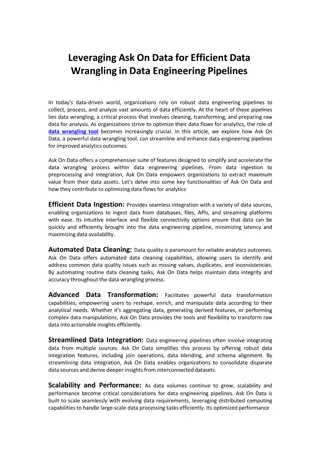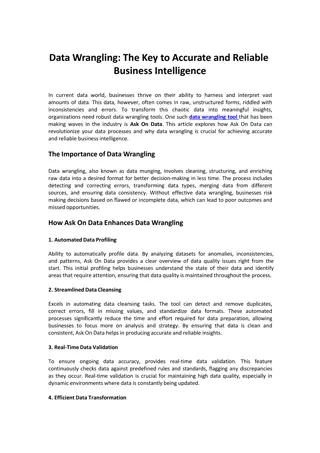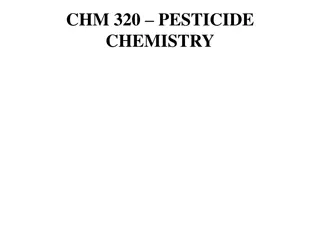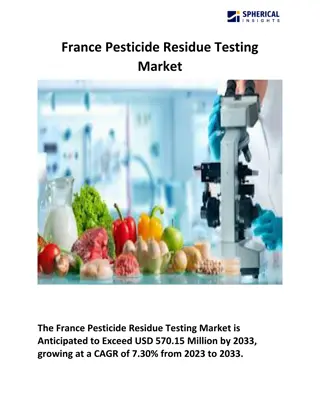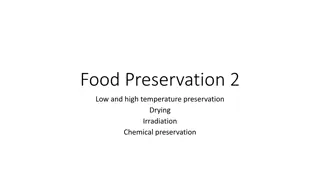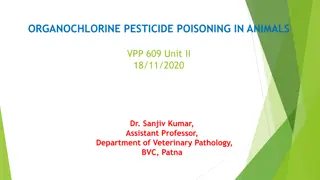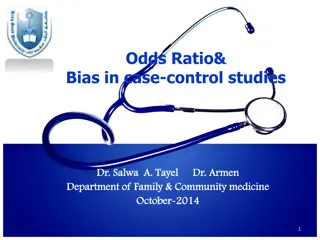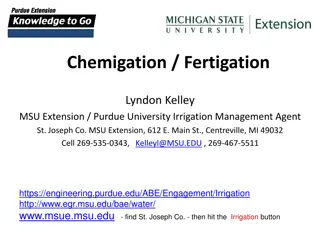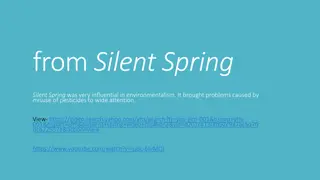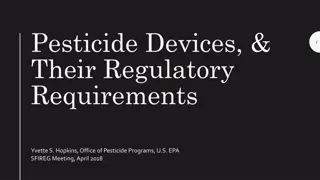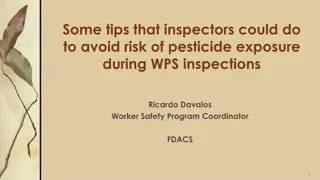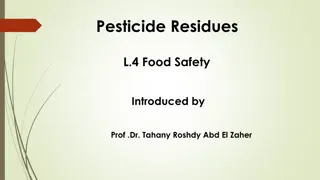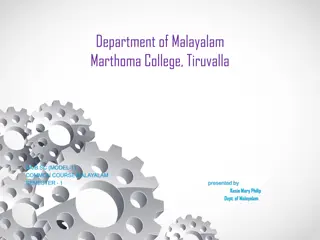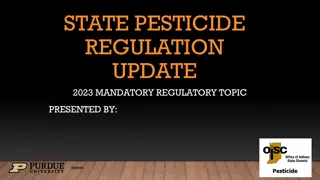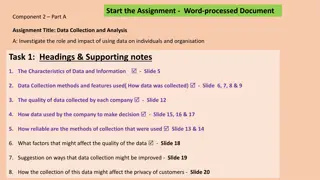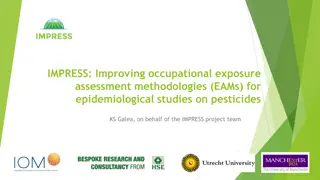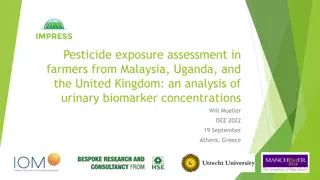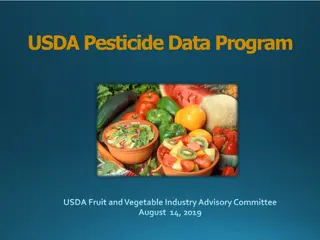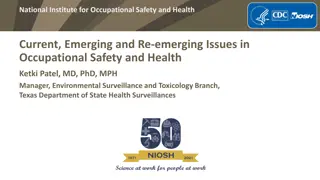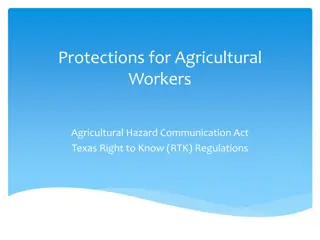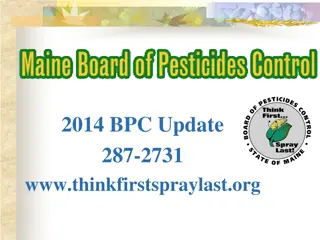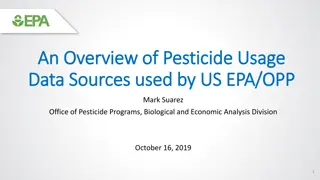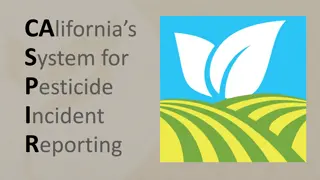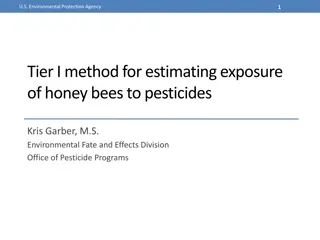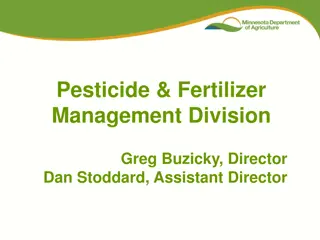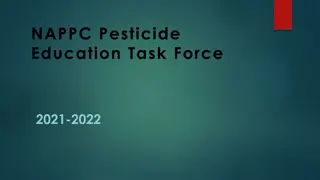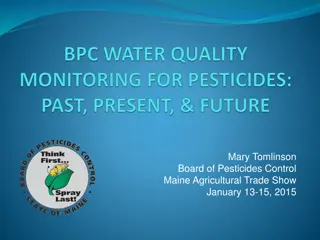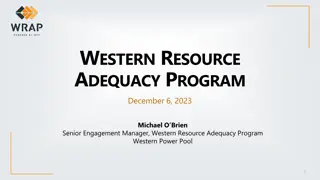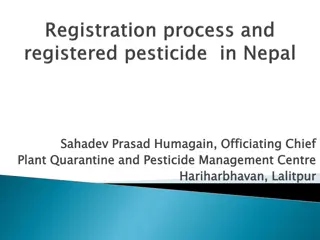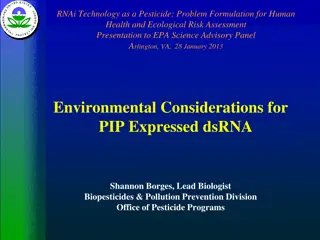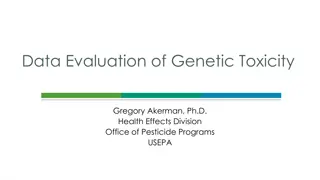Sustainable Rice Production in Pakistan: Challenges and Strategies
Pakistan's economy heavily relies on rice exports, with the country being a significant producer and exporter. However, challenges such as pesticide residues, major insect pests, and diseases threaten rice production. Key parameters for production include cultivation of improved varieties, pest mana
2 views • 42 slides
Understanding Hydroponics: Methods, Advantages, and Crops
Hydroponics, derived from Greek words meaning "working water," is a soilless plant-growing method. It offers various advantages like efficient water use, pesticide-free produce, and higher yields. Different types of hydroponic systems exist, enabling the cultivation of a wide range of crops. However
1 views • 15 slides
Ask On Data for Efficient Data Wrangling in Data Engineering
In today's data-driven world, organizations rely on robust data engineering pipelines to collect, process, and analyze vast amounts of data efficiently. At the heart of these pipelines lies data wrangling, a critical process that involves cleaning, transforming, and preparing raw data for analysis.
2 views • 2 slides
Data Wrangling like Ask On Data Provides Accurate and Reliable Business Intelligence
In current data world, businesses thrive on their ability to harness and interpret vast amounts of data. This data, however, often comes in raw, unstructured forms, riddled with inconsistencies and errors. To transform this chaotic data into meaningful insights, organizations need robust data wrangl
0 views • 2 slides
Understanding Pesticide Chemistry and Their Importance in Agriculture
Pesticides are essential for controlling pests, diseases, and microbes that harm plants. They include insecticides, herbicides, rodenticides, bacteriocides, nematocides, molluscides, algicides, and fungicides. Integrated pest management is crucial for effective pest control in agriculture.
0 views • 89 slides
France Pesticide Residue Testing Market
The France Pesticide Residue Testing Market is Anticipated to Exceed USD 570.15 Million by 2033, growing at a CAGR of 7.30% from 2023 to 2033.\u00a0\n
0 views • 4 slides
Understanding Blanching: A Key Step in Food Preservation
Blanching is a crucial pre-treatment process for vegetables and fruits in food preservation methods like canning, freezing, and dehydration. By rapidly heating the food and then cooling it, blanching helps inactivating enzymes, removing gases, brightening colors, and improving texture. This process
1 views • 17 slides
Understanding Organochlorine Pesticide Poisoning in Animals
Organochlorines are synthetic pesticides with high toxicity and slow degradation, posing a threat to both target and non-target species. Despite bans in developed countries, their use persists, leading to environmental persistence and bioaccumulation. Natural sources also contribute to organochlorin
0 views • 24 slides
Understanding Odds Ratio and Bias in Case-Control Studies
This educational material covers the essentials of odds ratio and bias in case-control studies, including how to construct a 2x2 table, calculate odds ratio, define bias, and interpret results. A specific case study on pesticide exposure and cancer is presented to illustrate these concepts. Readers
2 views • 20 slides
Understanding Monocultures and Hedgerows in Agriculture
Monoculture involves growing the same plant species closely together to increase productivity but has negative environmental impacts like reduced genetic diversity and increased pesticide use. Traditional crop rotations offer a sustainable alternative by breaking pest cycles and improving soil healt
0 views • 14 slides
Efficient Fertigation Practices for Improved Crop Yield
Enhance your crop yield with efficient fertigation practices outlined by Lyndon Kelley, an irrigation management agent at MSU Extension and Purdue University. Understand the key aspects of fertigation planning, including matching N uptake curves, optimizing N source availability, and utilizing irrig
0 views • 8 slides
Eye-Opening Environmental Facts and Impacts of Bottled Water Consumption
Silent Spring, an influential work in environmentalism, highlighted the dangers of pesticide misuse. The provided information sheds light on alarming environmental issues such as deforestation, plastic pollution, water scarcity, and species extinction. It also emphasizes the environmental impact of
0 views • 16 slides
Understanding Regulatory Requirements for Pesticide Devices
Pesticide devices, as defined by FIFRA, play a crucial role in trapping, destroying, repelling, or mitigating pests or plant and animal life. While not required to be registered with the EPA, these devices are regulated under FIFRA sections 2(q)(1), 7, and 8, with specific labeling and packaging req
0 views • 10 slides
Tips to Prevent Pesticide Exposure During WPS Inspections
Inspectors should be familiar with establishment operations, inquire about pesticide use, avoid entering treated areas without assurance, wear proper PPE, identify decontamination supplies, and practice good hygiene to minimize the risk of pesticide exposure during inspections. These precautions hel
5 views • 10 slides
Understanding Data Governance and Data Analytics in Information Management
Data Governance and Data Analytics play crucial roles in transforming data into knowledge and insights for generating positive impacts on various operational systems. They help bring together disparate datasets to glean valuable insights and wisdom to drive informed decision-making. Managing data ma
0 views • 8 slides
Extraction Methods in Pesticide Residue Analysis for Food Safety
Extraction methods play a crucial role in separating pesticide residues from food matrices for analysis. Techniques involve using solvents to efficiently remove pesticides without causing chemical changes. The choice of extraction method depends on the substrate type, with liquid and solid substrate
6 views • 25 slides
Department of Malayalam Marthoma College, Tiruvalla - Malayalam Semester-1
Department of Malayalam at Marthoma College, Tiruvalla offers a BA/B.Sc. (Model 1) Common Course in Malayalam for Semester 1. The course includes the study of Malayalam literature and culture. Enmakaje and Valiya Chirakulla Pakshikal are two prominent works discussed, focusing on environmental issue
5 views • 7 slides
Nutrition Quiz Slides
This set of nutrition quiz slides will test your knowledge on vitamins, water types, pesticide monitoring, recommended fruit and vegetable intake, nutrients in fruits, and fruit pricing. Each question is followed by a 10-second duration before revealing the answer.
0 views • 89 slides
State Pesticide Regulation Update 2023: Mandatory Changes and Stakeholder Involvement
The State Pesticide Regulation Update for 2023 brings significant changes including Restricted Use Pesticide applications, record-keeping requirements, and supervision of applicators. The revisions were prompted by applicator certification and training rules set by the EPA, along with public awarene
0 views • 25 slides
Understanding Data Collection and Analysis for Businesses
Explore the impact and role of data utilization in organizations through the investigation of data collection methods, data quality, decision-making processes, reliability of collection methods, factors affecting data quality, and privacy considerations. Two scenarios are presented: data collection
1 views • 24 slides
Enhancing Pesticide Exposure Assessment for Epidemiological Studies
Focuses on IMPRESS project aiming to improve methodologies for assessing occupational pesticide exposure in epidemiological studies. Reviews challenges in retrospective exposure assessment, proposes methodologies, and presents key project results to date, emphasizing the use of various exposure asse
1 views • 15 slides
Pesticide Exposure Assessment in Farmers from Malaysia, Uganda, and the United Kingdom
This study evaluates the impact of pesticide exposure on farmers' health in Malaysia, Uganda, and the UK using urinary biomarker concentrations. Multiple cohorts are analyzed to assess associations between exposure-modifying factors and urine metabolite measurements. The IMPRESS project focuses on i
0 views • 12 slides
Essential Elements of IPM Policy and Plan for Facility Managers
Understanding the key elements of an IPM policy and plan is crucial for successfully implementing an Integrated Pest Management program. This self-guided education module covers writing IPM policies and plans, securing formal approval, implementing and maintaining policies, and more. It emphasizes t
0 views • 32 slides
Enhancing Pesticide Spray Effectiveness with Adjuvants for Rosarians
Adjuvants play a crucial role in improving the efficacy of pesticide applications for rosarians. They aid in maximizing the impact of pesticides by enhancing their application process. Various types of adjuvants, such as surfactants, extenders, and penetrants, serve different purposes like adjusting
0 views • 11 slides
USDA Pesticide Data Program Overview
The USDA Pesticide Data Program (PDP) provides high-quality pesticide residue data for US foods to support regulatory decision-making and ensure food safety. Through cooperative agreements with participating states, the program conducts sampling of various commodities, including fresh fruits and veg
0 views • 17 slides
Occupational Pesticide Safety and Health Concerns
Occupational safety and health issues related to pesticide exposure are a significant concern globally. Limited surveillance data on pesticide exposure and related illnesses are available, with a high percentage of farmers being affected annually. Various occupations beyond farming also face potenti
1 views • 25 slides
Agricultural Workers' Protections under Right-to-Know Regulations
Agricultural workers in Texas have rights under the Agricultural Hazard Communication Act, also known as Right-to-Know (RTK) Law. This Act ensures that agricultural workers receive essential information regarding pesticide exposure, workplace chemicals, and their entitlement to health and safety det
0 views • 15 slides
Important Updates in Pesticide Regulations and Program Changes
New pesticide regulations and program changes are introduced, including requirements for obtaining a pesticide applicator license, major proposed changes to the Worker Protection Standard (WPS) by the EPA, introduction of new inspectors, and the phaseout of Endosulfan. Special Maine registrations fo
0 views • 66 slides
Understanding Pesticide Data Collection and Analysis
Pesticide data usage is crucial for accurate assessments and prioritization of areas with high likelihood of usage. Various sources, quality requirements, and data considerations are highlighted, emphasizing the importance of incorporating usage data for informed decision-making.
0 views • 12 slides
Essential Facilities in a Bio-Pesticide Laboratory for Smart Agriculture
Establishing a bio-pesticide laboratory is vital for research, development, and mass production of bio-pesticides. Key rooms include sterilization, media preparation, inoculation, growth chamber, mixing, insect rearing, and washing rooms. The sterilization room houses equipment like autoclave and ho
0 views • 10 slides
California's System for Pesticide Incident Reporting Overview
Explore California's CASPIR system for reporting pesticide incidents, designed to enhance communication between counties, DPR, and fieldworker groups. The system's timeline, purpose, and key features, including incident report submission, intelligent case routing, mobile app functionality, and admin
0 views • 33 slides
Conservation Challenges and Opportunities in the 2018 Farm Bill
The 2018 Farm Bill presents a battleground where conservation, environmental protection, and agricultural interests collide. Key issues include changes in the Clean Water Act, pesticide use, CAFO operations, NEPA requirements, and potential impacts on conservation programs like the Conservation Stew
0 views • 7 slides
U.S. EPA Tier I Method for Bee Pesticide Exposure Estimation
Tier I assessment by the U.S. Environmental Protection Agency focuses on generating conservative estimates of pesticide exposures to honey bees. The goal is to differentiate pesticides that pose risks to bees from those needing further evaluation. The process involves considering food consumption ra
0 views • 53 slides
Pesticide & Fertilizer Management Division Overview
The Pesticide & Fertilizer Management Division is a key state agency in Minnesota responsible for regulating pesticides and fertilizers, protecting groundwater, responding to emergencies, managing spills, and promoting agricultural water quality. The division works with farmers, industry stakeholder
0 views • 11 slides
NAPPC Pesticide Education Task Force 2021-2022 Summary
The NAPPC Pesticide Education Task Force for 2021-2022 aims to utilize pesticide registration and regulation as tools to safeguard and enhance pollinator health. The task force focuses on educating various audiences, including pesticide applicators, farmers, homeowners, educators, and state departme
1 views • 15 slides
Exploring Pesticide Monitoring and Contamination Studies in Maine
Mary Tomlinson's work with the Maine Board of Pesticides Control includes past studies on groundwater and surface water monitoring, ongoing monitoring initiatives, and future collaborative studies. The State Law mandates residue surveys to identify possible contamination sources and develop a pestic
1 views • 55 slides
Western Resource Adequacy Program Overview
Western Resource Adequacy Program (WRAP) is a vital initiative in the Western Power Pool, providing valuable grid integration and coordination services to its customer-members across the entire Western Interconnection. As the Program Administrator, Western Power Pool undertakes all necessary actions
0 views • 11 slides
Procedures and Management of Pesticide Registration in Nepal
This content provides detailed information on the registration procedures, management, and regulation of pesticides in Nepal. It covers the registration method, advantages of analogous registration, banned pesticides list, types of pesticides, and essential documentation requirements for pesticide r
0 views • 43 slides
Understanding Environmental Risks of RNAi Technology as a Pesticide
This presentation discusses the environmental considerations and risk assessments associated with RNAi technology as a pesticide, focusing on the unique challenges presented by dsRNA PIPs. Topics covered include ecological risk assessments, nontarget organism exposure, exposure assessments for PIP p
0 views • 13 slides
Evaluation of Genetic Toxicity in Pesticide Programs - Data Overview
The presentation by Dr. Gregory Akerman discusses the evaluation of genetic toxicity, focusing on genotoxicity data for glyphosate, including gene mutation, chromosomal abnormality, and primary DNA damage. It explores the consequences of genotoxicity, such as cancer risks and cell death, along with
0 views • 27 slides


